Organisational Culture and Employee Motivation at Unilever
VerifiedAdded on 2022/11/30
|11
|3336
|91
Report
AI Summary
This report provides a comprehensive analysis of organisational behaviour at Unilever, examining the company's culture, communication strategies, and their impact on employee motivation and organisational effectiveness. It begins with an introduction to organisational behaviour and Unilever, followed by an in-depth exploration of Unilever's organisational culture, including its values, practices, and the role of leaders. The report then delves into how the company's culture enhances organisational effectiveness, with a specific focus on communication, including its functions and the 7 C's of communication. The Charles Handy model is also used to explain the organisational culture. The report further identifies the role of culture in motivating employees, referencing Maslow's hierarchy of needs. Finally, it describes how Unilever can leverage its culture for continued success, before concluding with a summary of the key findings.
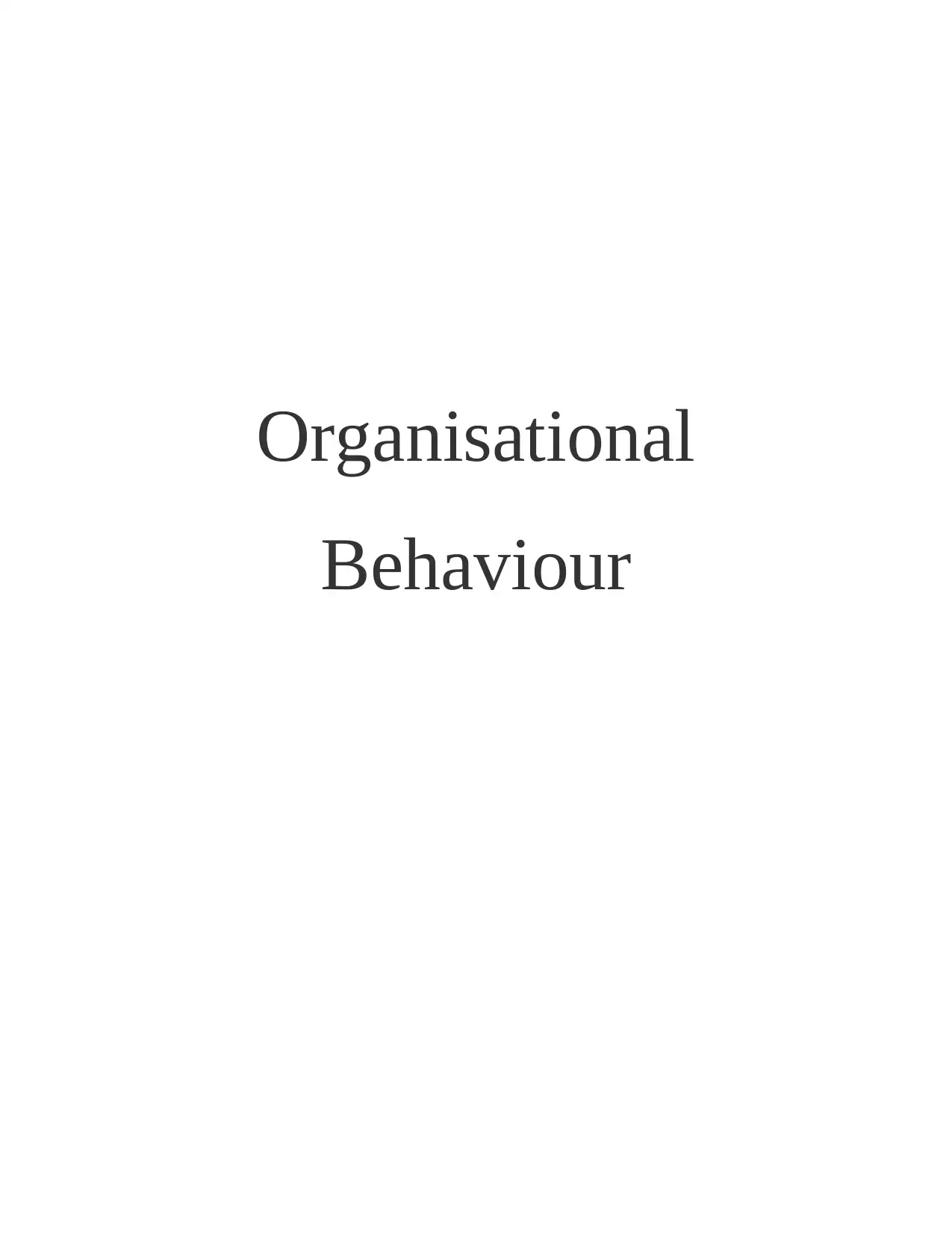
Organisational
Behaviour
Behaviour
Paraphrase This Document
Need a fresh take? Get an instant paraphrase of this document with our AI Paraphraser
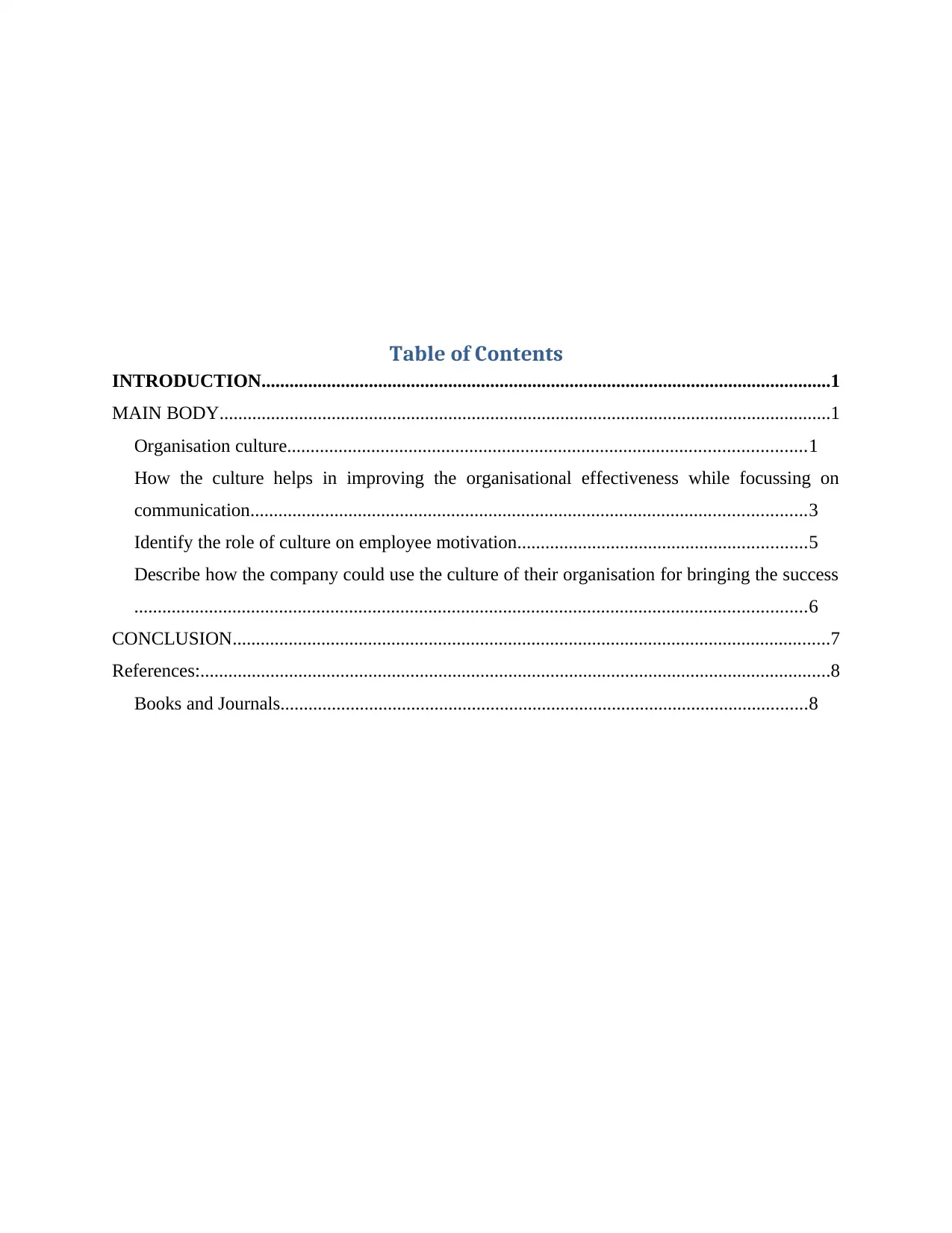
Table of Contents
INTRODUCTION..........................................................................................................................1
MAIN BODY...................................................................................................................................1
Organisation culture...............................................................................................................1
How the culture helps in improving the organisational effectiveness while focussing on
communication.......................................................................................................................3
Identify the role of culture on employee motivation..............................................................5
Describe how the company could use the culture of their organisation for bringing the success
................................................................................................................................................6
CONCLUSION................................................................................................................................7
References:.......................................................................................................................................8
Books and Journals.................................................................................................................8
INTRODUCTION..........................................................................................................................1
MAIN BODY...................................................................................................................................1
Organisation culture...............................................................................................................1
How the culture helps in improving the organisational effectiveness while focussing on
communication.......................................................................................................................3
Identify the role of culture on employee motivation..............................................................5
Describe how the company could use the culture of their organisation for bringing the success
................................................................................................................................................6
CONCLUSION................................................................................................................................7
References:.......................................................................................................................................8
Books and Journals.................................................................................................................8
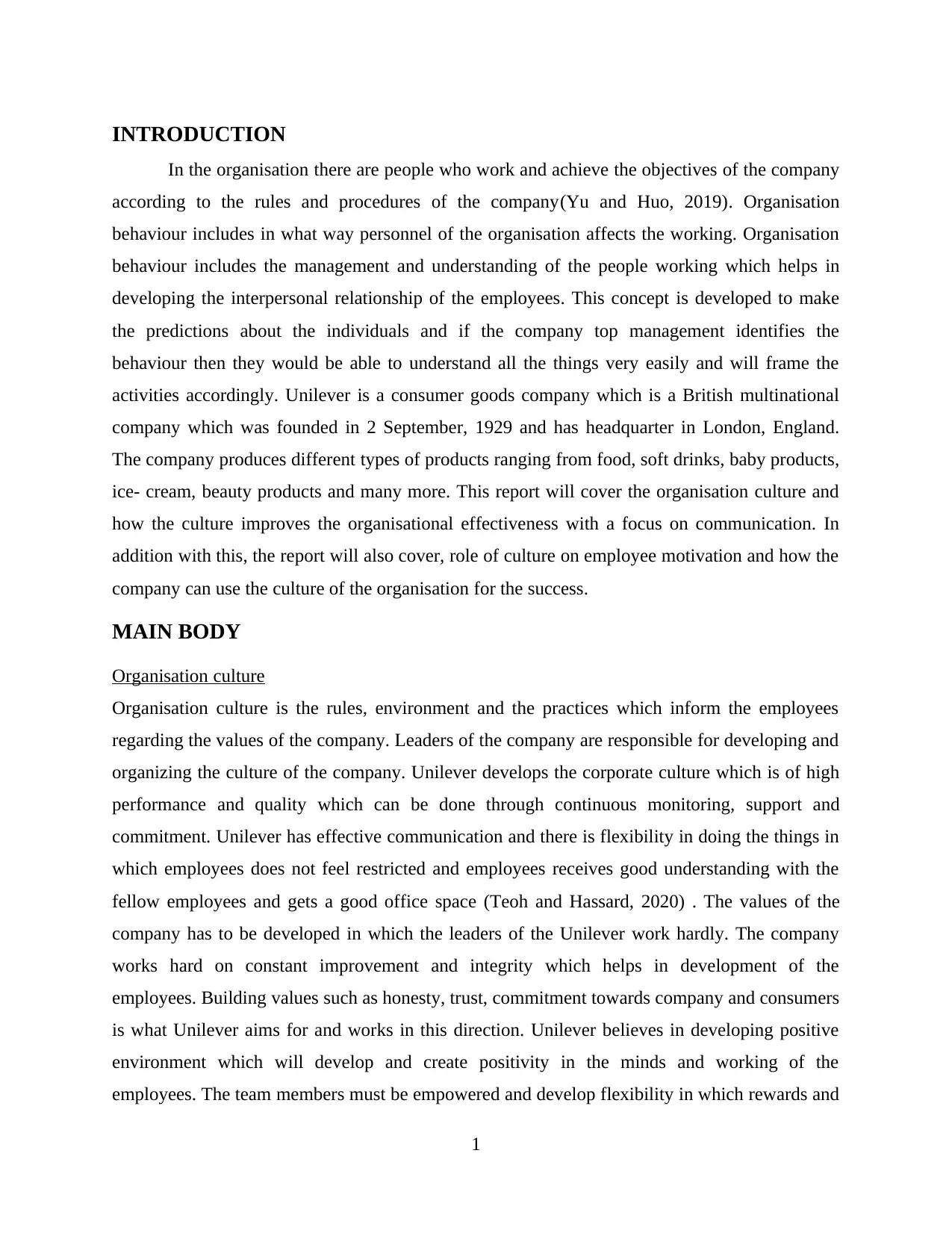
INTRODUCTION
In the organisation there are people who work and achieve the objectives of the company
according to the rules and procedures of the company(Yu and Huo, 2019). Organisation
behaviour includes in what way personnel of the organisation affects the working. Organisation
behaviour includes the management and understanding of the people working which helps in
developing the interpersonal relationship of the employees. This concept is developed to make
the predictions about the individuals and if the company top management identifies the
behaviour then they would be able to understand all the things very easily and will frame the
activities accordingly. Unilever is a consumer goods company which is a British multinational
company which was founded in 2 September, 1929 and has headquarter in London, England.
The company produces different types of products ranging from food, soft drinks, baby products,
ice- cream, beauty products and many more. This report will cover the organisation culture and
how the culture improves the organisational effectiveness with a focus on communication. In
addition with this, the report will also cover, role of culture on employee motivation and how the
company can use the culture of the organisation for the success.
MAIN BODY
Organisation culture
Organisation culture is the rules, environment and the practices which inform the employees
regarding the values of the company. Leaders of the company are responsible for developing and
organizing the culture of the company. Unilever develops the corporate culture which is of high
performance and quality which can be done through continuous monitoring, support and
commitment. Unilever has effective communication and there is flexibility in doing the things in
which employees does not feel restricted and employees receives good understanding with the
fellow employees and gets a good office space (Teoh and Hassard, 2020) . The values of the
company has to be developed in which the leaders of the Unilever work hardly. The company
works hard on constant improvement and integrity which helps in development of the
employees. Building values such as honesty, trust, commitment towards company and consumers
is what Unilever aims for and works in this direction. Unilever believes in developing positive
environment which will develop and create positivity in the minds and working of the
employees. The team members must be empowered and develop flexibility in which rewards and
1
In the organisation there are people who work and achieve the objectives of the company
according to the rules and procedures of the company(Yu and Huo, 2019). Organisation
behaviour includes in what way personnel of the organisation affects the working. Organisation
behaviour includes the management and understanding of the people working which helps in
developing the interpersonal relationship of the employees. This concept is developed to make
the predictions about the individuals and if the company top management identifies the
behaviour then they would be able to understand all the things very easily and will frame the
activities accordingly. Unilever is a consumer goods company which is a British multinational
company which was founded in 2 September, 1929 and has headquarter in London, England.
The company produces different types of products ranging from food, soft drinks, baby products,
ice- cream, beauty products and many more. This report will cover the organisation culture and
how the culture improves the organisational effectiveness with a focus on communication. In
addition with this, the report will also cover, role of culture on employee motivation and how the
company can use the culture of the organisation for the success.
MAIN BODY
Organisation culture
Organisation culture is the rules, environment and the practices which inform the employees
regarding the values of the company. Leaders of the company are responsible for developing and
organizing the culture of the company. Unilever develops the corporate culture which is of high
performance and quality which can be done through continuous monitoring, support and
commitment. Unilever has effective communication and there is flexibility in doing the things in
which employees does not feel restricted and employees receives good understanding with the
fellow employees and gets a good office space (Teoh and Hassard, 2020) . The values of the
company has to be developed in which the leaders of the Unilever work hardly. The company
works hard on constant improvement and integrity which helps in development of the
employees. Building values such as honesty, trust, commitment towards company and consumers
is what Unilever aims for and works in this direction. Unilever believes in developing positive
environment which will develop and create positivity in the minds and working of the
employees. The team members must be empowered and develop flexibility in which rewards and
1
⊘ This is a preview!⊘
Do you want full access?
Subscribe today to unlock all pages.

Trusted by 1+ million students worldwide
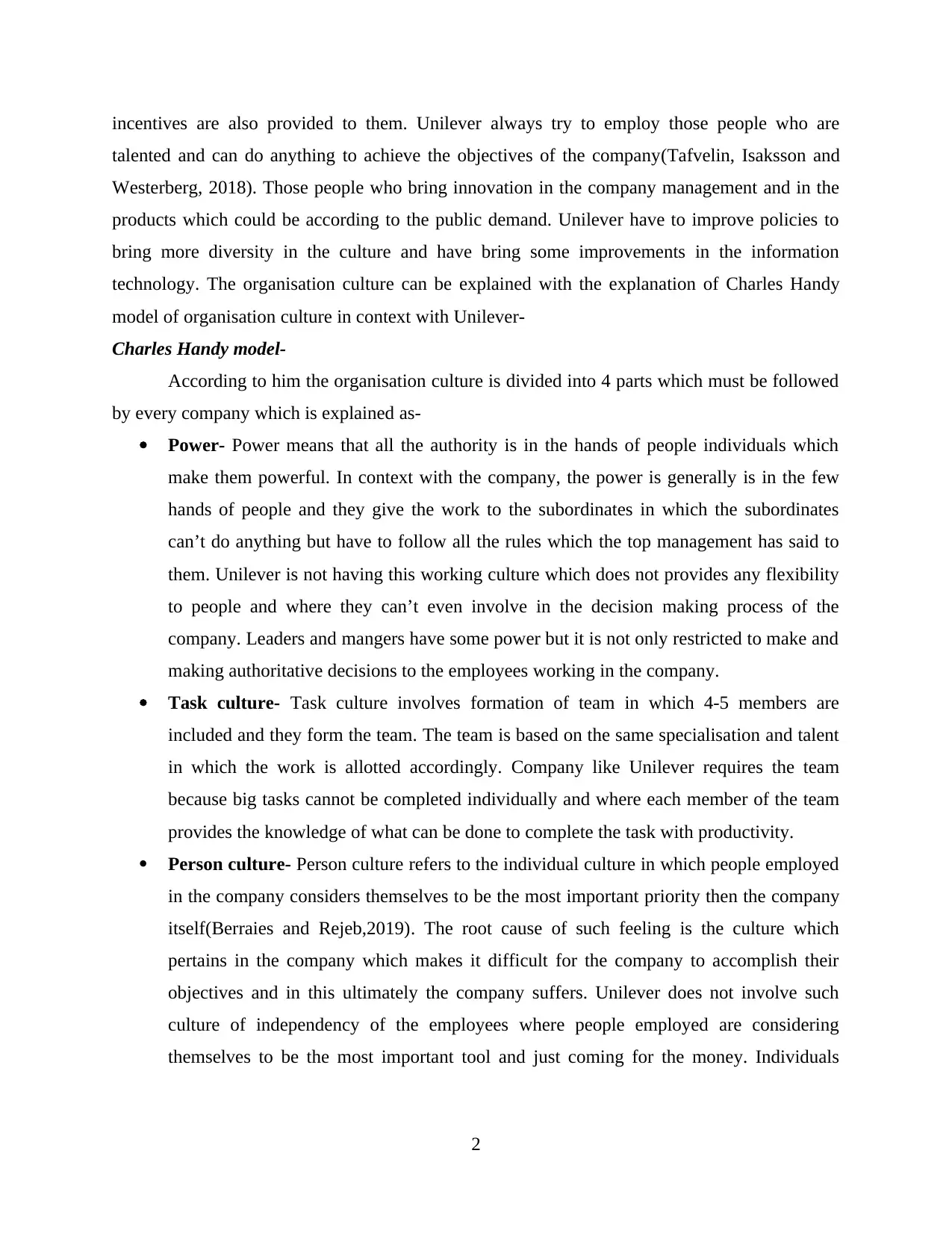
incentives are also provided to them. Unilever always try to employ those people who are
talented and can do anything to achieve the objectives of the company(Tafvelin, Isaksson and
Westerberg, 2018). Those people who bring innovation in the company management and in the
products which could be according to the public demand. Unilever have to improve policies to
bring more diversity in the culture and have bring some improvements in the information
technology. The organisation culture can be explained with the explanation of Charles Handy
model of organisation culture in context with Unilever-
Charles Handy model-
According to him the organisation culture is divided into 4 parts which must be followed
by every company which is explained as-
Power- Power means that all the authority is in the hands of people individuals which
make them powerful. In context with the company, the power is generally is in the few
hands of people and they give the work to the subordinates in which the subordinates
can’t do anything but have to follow all the rules which the top management has said to
them. Unilever is not having this working culture which does not provides any flexibility
to people and where they can’t even involve in the decision making process of the
company. Leaders and mangers have some power but it is not only restricted to make and
making authoritative decisions to the employees working in the company.
Task culture- Task culture involves formation of team in which 4-5 members are
included and they form the team. The team is based on the same specialisation and talent
in which the work is allotted accordingly. Company like Unilever requires the team
because big tasks cannot be completed individually and where each member of the team
provides the knowledge of what can be done to complete the task with productivity.
Person culture- Person culture refers to the individual culture in which people employed
in the company considers themselves to be the most important priority then the company
itself(Berraies and Rejeb,2019). The root cause of such feeling is the culture which
pertains in the company which makes it difficult for the company to accomplish their
objectives and in this ultimately the company suffers. Unilever does not involve such
culture of independency of the employees where people employed are considering
themselves to be the most important tool and just coming for the money. Individuals
2
talented and can do anything to achieve the objectives of the company(Tafvelin, Isaksson and
Westerberg, 2018). Those people who bring innovation in the company management and in the
products which could be according to the public demand. Unilever have to improve policies to
bring more diversity in the culture and have bring some improvements in the information
technology. The organisation culture can be explained with the explanation of Charles Handy
model of organisation culture in context with Unilever-
Charles Handy model-
According to him the organisation culture is divided into 4 parts which must be followed
by every company which is explained as-
Power- Power means that all the authority is in the hands of people individuals which
make them powerful. In context with the company, the power is generally is in the few
hands of people and they give the work to the subordinates in which the subordinates
can’t do anything but have to follow all the rules which the top management has said to
them. Unilever is not having this working culture which does not provides any flexibility
to people and where they can’t even involve in the decision making process of the
company. Leaders and mangers have some power but it is not only restricted to make and
making authoritative decisions to the employees working in the company.
Task culture- Task culture involves formation of team in which 4-5 members are
included and they form the team. The team is based on the same specialisation and talent
in which the work is allotted accordingly. Company like Unilever requires the team
because big tasks cannot be completed individually and where each member of the team
provides the knowledge of what can be done to complete the task with productivity.
Person culture- Person culture refers to the individual culture in which people employed
in the company considers themselves to be the most important priority then the company
itself(Berraies and Rejeb,2019). The root cause of such feeling is the culture which
pertains in the company which makes it difficult for the company to accomplish their
objectives and in this ultimately the company suffers. Unilever does not involve such
culture of independency of the employees where people employed are considering
themselves to be the most important tool and just coming for the money. Individuals
2
Paraphrase This Document
Need a fresh take? Get an instant paraphrase of this document with our AI Paraphraser
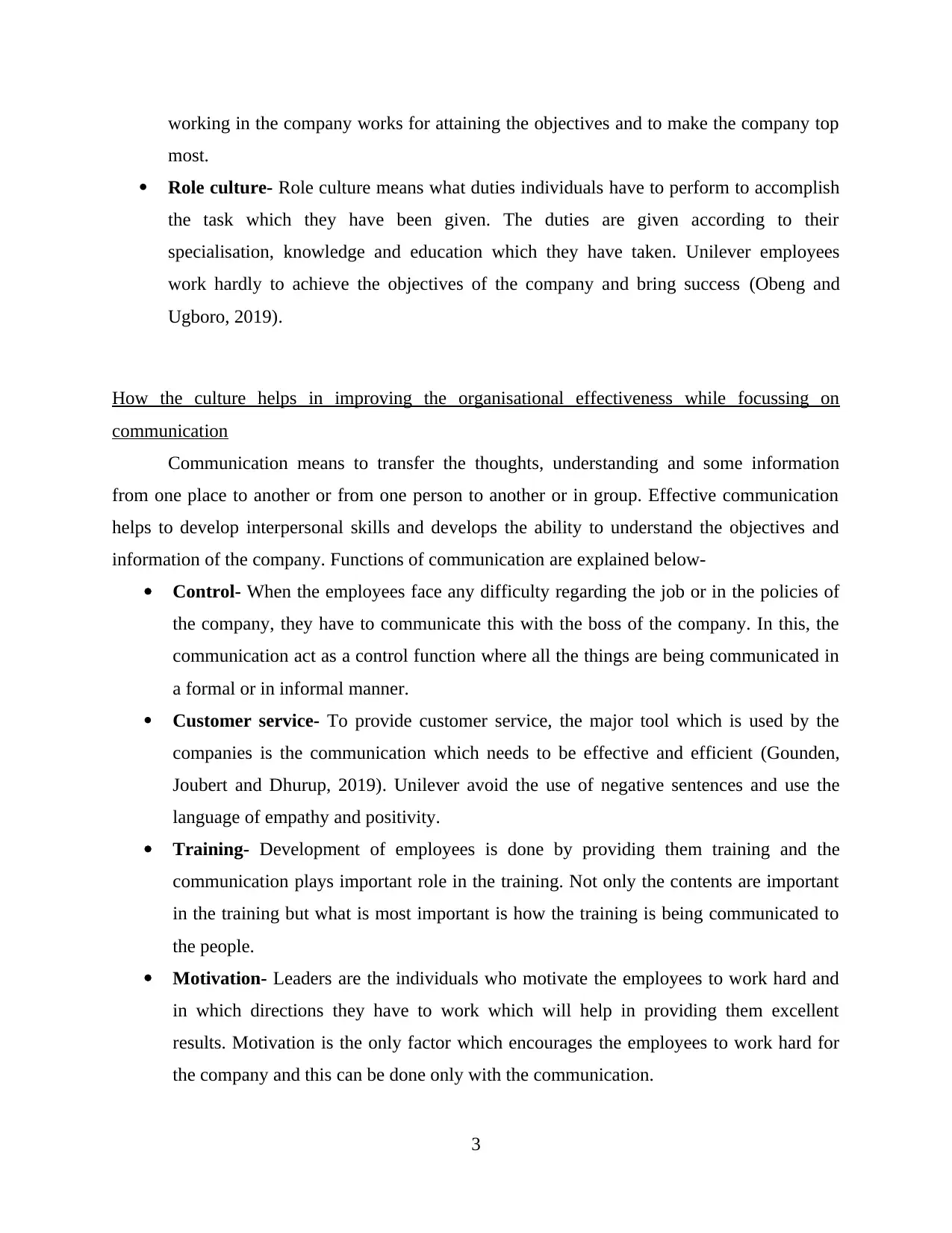
working in the company works for attaining the objectives and to make the company top
most.
Role culture- Role culture means what duties individuals have to perform to accomplish
the task which they have been given. The duties are given according to their
specialisation, knowledge and education which they have taken. Unilever employees
work hardly to achieve the objectives of the company and bring success (Obeng and
Ugboro, 2019).
How the culture helps in improving the organisational effectiveness while focussing on
communication
Communication means to transfer the thoughts, understanding and some information
from one place to another or from one person to another or in group. Effective communication
helps to develop interpersonal skills and develops the ability to understand the objectives and
information of the company. Functions of communication are explained below-
Control- When the employees face any difficulty regarding the job or in the policies of
the company, they have to communicate this with the boss of the company. In this, the
communication act as a control function where all the things are being communicated in
a formal or in informal manner.
Customer service- To provide customer service, the major tool which is used by the
companies is the communication which needs to be effective and efficient (Gounden,
Joubert and Dhurup, 2019). Unilever avoid the use of negative sentences and use the
language of empathy and positivity.
Training- Development of employees is done by providing them training and the
communication plays important role in the training. Not only the contents are important
in the training but what is most important is how the training is being communicated to
the people.
Motivation- Leaders are the individuals who motivate the employees to work hard and
in which directions they have to work which will help in providing them excellent
results. Motivation is the only factor which encourages the employees to work hard for
the company and this can be done only with the communication.
3
most.
Role culture- Role culture means what duties individuals have to perform to accomplish
the task which they have been given. The duties are given according to their
specialisation, knowledge and education which they have taken. Unilever employees
work hardly to achieve the objectives of the company and bring success (Obeng and
Ugboro, 2019).
How the culture helps in improving the organisational effectiveness while focussing on
communication
Communication means to transfer the thoughts, understanding and some information
from one place to another or from one person to another or in group. Effective communication
helps to develop interpersonal skills and develops the ability to understand the objectives and
information of the company. Functions of communication are explained below-
Control- When the employees face any difficulty regarding the job or in the policies of
the company, they have to communicate this with the boss of the company. In this, the
communication act as a control function where all the things are being communicated in
a formal or in informal manner.
Customer service- To provide customer service, the major tool which is used by the
companies is the communication which needs to be effective and efficient (Gounden,
Joubert and Dhurup, 2019). Unilever avoid the use of negative sentences and use the
language of empathy and positivity.
Training- Development of employees is done by providing them training and the
communication plays important role in the training. Not only the contents are important
in the training but what is most important is how the training is being communicated to
the people.
Motivation- Leaders are the individuals who motivate the employees to work hard and
in which directions they have to work which will help in providing them excellent
results. Motivation is the only factor which encourages the employees to work hard for
the company and this can be done only with the communication.
3
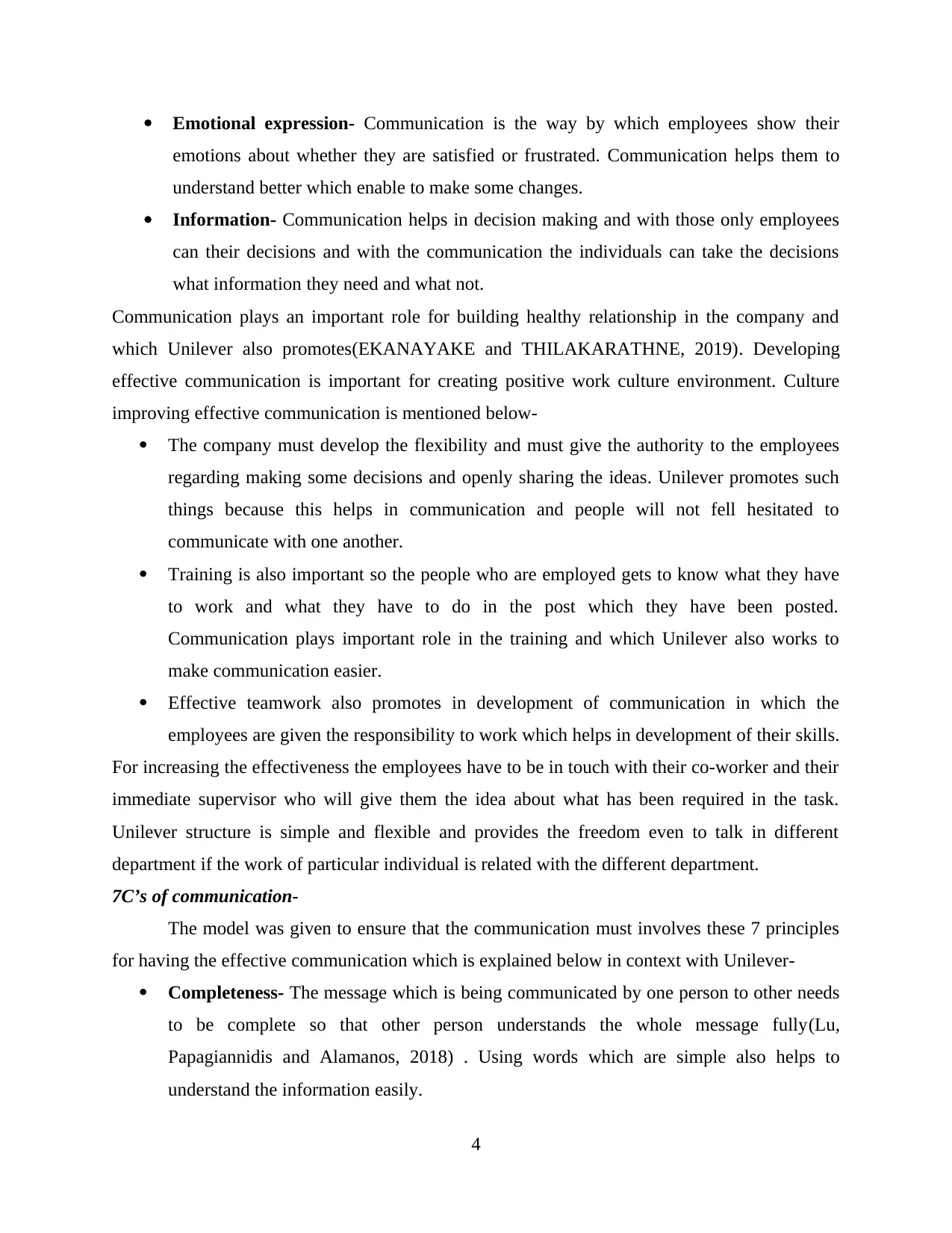
Emotional expression- Communication is the way by which employees show their
emotions about whether they are satisfied or frustrated. Communication helps them to
understand better which enable to make some changes.
Information- Communication helps in decision making and with those only employees
can their decisions and with the communication the individuals can take the decisions
what information they need and what not.
Communication plays an important role for building healthy relationship in the company and
which Unilever also promotes(EKANAYAKE and THILAKARATHNE, 2019). Developing
effective communication is important for creating positive work culture environment. Culture
improving effective communication is mentioned below-
The company must develop the flexibility and must give the authority to the employees
regarding making some decisions and openly sharing the ideas. Unilever promotes such
things because this helps in communication and people will not fell hesitated to
communicate with one another.
Training is also important so the people who are employed gets to know what they have
to work and what they have to do in the post which they have been posted.
Communication plays important role in the training and which Unilever also works to
make communication easier.
Effective teamwork also promotes in development of communication in which the
employees are given the responsibility to work which helps in development of their skills.
For increasing the effectiveness the employees have to be in touch with their co-worker and their
immediate supervisor who will give them the idea about what has been required in the task.
Unilever structure is simple and flexible and provides the freedom even to talk in different
department if the work of particular individual is related with the different department.
7C’s of communication-
The model was given to ensure that the communication must involves these 7 principles
for having the effective communication which is explained below in context with Unilever-
Completeness- The message which is being communicated by one person to other needs
to be complete so that other person understands the whole message fully(Lu,
Papagiannidis and Alamanos, 2018) . Using words which are simple also helps to
understand the information easily.
4
emotions about whether they are satisfied or frustrated. Communication helps them to
understand better which enable to make some changes.
Information- Communication helps in decision making and with those only employees
can their decisions and with the communication the individuals can take the decisions
what information they need and what not.
Communication plays an important role for building healthy relationship in the company and
which Unilever also promotes(EKANAYAKE and THILAKARATHNE, 2019). Developing
effective communication is important for creating positive work culture environment. Culture
improving effective communication is mentioned below-
The company must develop the flexibility and must give the authority to the employees
regarding making some decisions and openly sharing the ideas. Unilever promotes such
things because this helps in communication and people will not fell hesitated to
communicate with one another.
Training is also important so the people who are employed gets to know what they have
to work and what they have to do in the post which they have been posted.
Communication plays important role in the training and which Unilever also works to
make communication easier.
Effective teamwork also promotes in development of communication in which the
employees are given the responsibility to work which helps in development of their skills.
For increasing the effectiveness the employees have to be in touch with their co-worker and their
immediate supervisor who will give them the idea about what has been required in the task.
Unilever structure is simple and flexible and provides the freedom even to talk in different
department if the work of particular individual is related with the different department.
7C’s of communication-
The model was given to ensure that the communication must involves these 7 principles
for having the effective communication which is explained below in context with Unilever-
Completeness- The message which is being communicated by one person to other needs
to be complete so that other person understands the whole message fully(Lu,
Papagiannidis and Alamanos, 2018) . Using words which are simple also helps to
understand the information easily.
4
⊘ This is a preview!⊘
Do you want full access?
Subscribe today to unlock all pages.

Trusted by 1+ million students worldwide
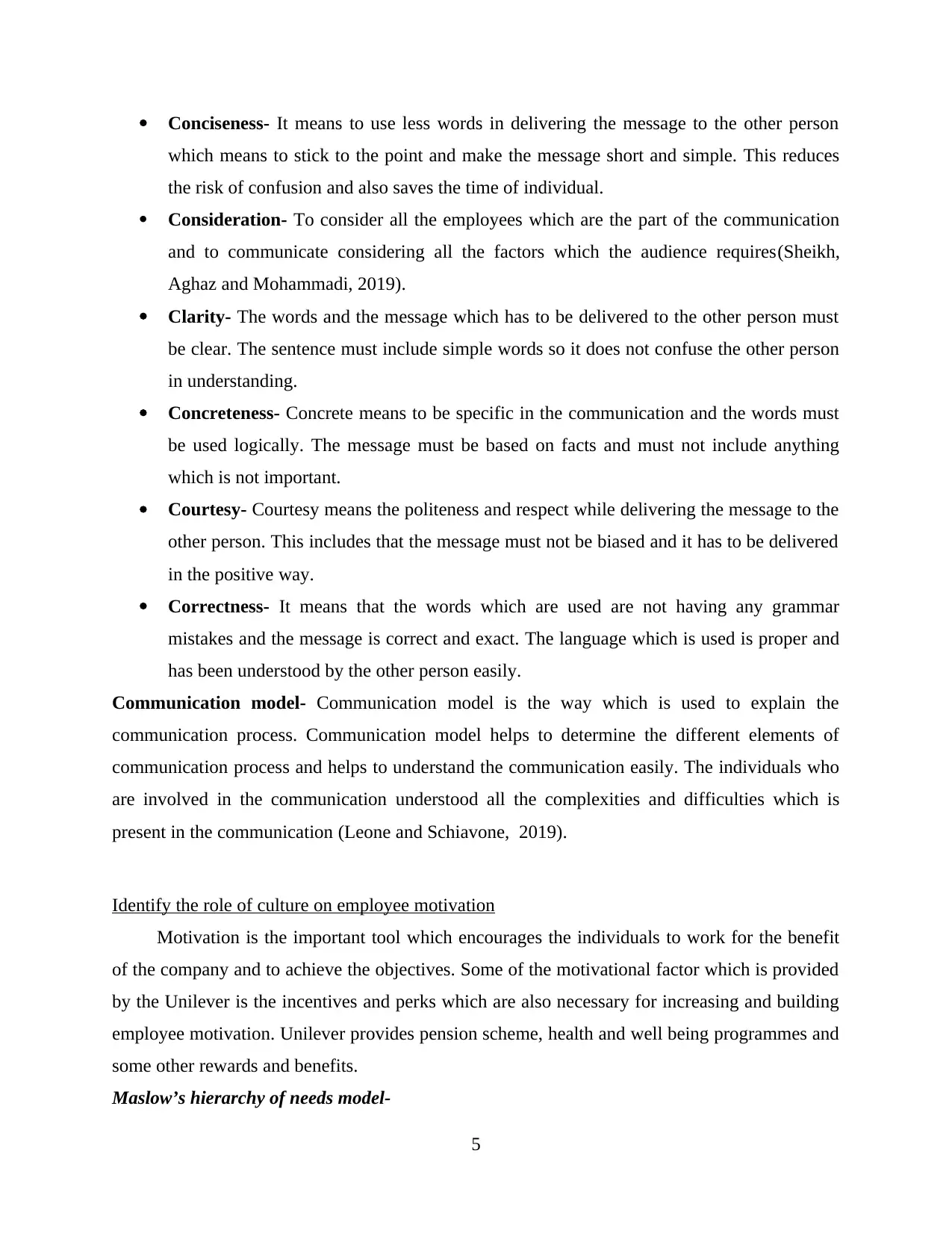
Conciseness- It means to use less words in delivering the message to the other person
which means to stick to the point and make the message short and simple. This reduces
the risk of confusion and also saves the time of individual.
Consideration- To consider all the employees which are the part of the communication
and to communicate considering all the factors which the audience requires(Sheikh,
Aghaz and Mohammadi, 2019).
Clarity- The words and the message which has to be delivered to the other person must
be clear. The sentence must include simple words so it does not confuse the other person
in understanding.
Concreteness- Concrete means to be specific in the communication and the words must
be used logically. The message must be based on facts and must not include anything
which is not important.
Courtesy- Courtesy means the politeness and respect while delivering the message to the
other person. This includes that the message must not be biased and it has to be delivered
in the positive way.
Correctness- It means that the words which are used are not having any grammar
mistakes and the message is correct and exact. The language which is used is proper and
has been understood by the other person easily.
Communication model- Communication model is the way which is used to explain the
communication process. Communication model helps to determine the different elements of
communication process and helps to understand the communication easily. The individuals who
are involved in the communication understood all the complexities and difficulties which is
present in the communication (Leone and Schiavone, 2019).
Identify the role of culture on employee motivation
Motivation is the important tool which encourages the individuals to work for the benefit
of the company and to achieve the objectives. Some of the motivational factor which is provided
by the Unilever is the incentives and perks which are also necessary for increasing and building
employee motivation. Unilever provides pension scheme, health and well being programmes and
some other rewards and benefits.
Maslow’s hierarchy of needs model-
5
which means to stick to the point and make the message short and simple. This reduces
the risk of confusion and also saves the time of individual.
Consideration- To consider all the employees which are the part of the communication
and to communicate considering all the factors which the audience requires(Sheikh,
Aghaz and Mohammadi, 2019).
Clarity- The words and the message which has to be delivered to the other person must
be clear. The sentence must include simple words so it does not confuse the other person
in understanding.
Concreteness- Concrete means to be specific in the communication and the words must
be used logically. The message must be based on facts and must not include anything
which is not important.
Courtesy- Courtesy means the politeness and respect while delivering the message to the
other person. This includes that the message must not be biased and it has to be delivered
in the positive way.
Correctness- It means that the words which are used are not having any grammar
mistakes and the message is correct and exact. The language which is used is proper and
has been understood by the other person easily.
Communication model- Communication model is the way which is used to explain the
communication process. Communication model helps to determine the different elements of
communication process and helps to understand the communication easily. The individuals who
are involved in the communication understood all the complexities and difficulties which is
present in the communication (Leone and Schiavone, 2019).
Identify the role of culture on employee motivation
Motivation is the important tool which encourages the individuals to work for the benefit
of the company and to achieve the objectives. Some of the motivational factor which is provided
by the Unilever is the incentives and perks which are also necessary for increasing and building
employee motivation. Unilever provides pension scheme, health and well being programmes and
some other rewards and benefits.
Maslow’s hierarchy of needs model-
5
Paraphrase This Document
Need a fresh take? Get an instant paraphrase of this document with our AI Paraphraser
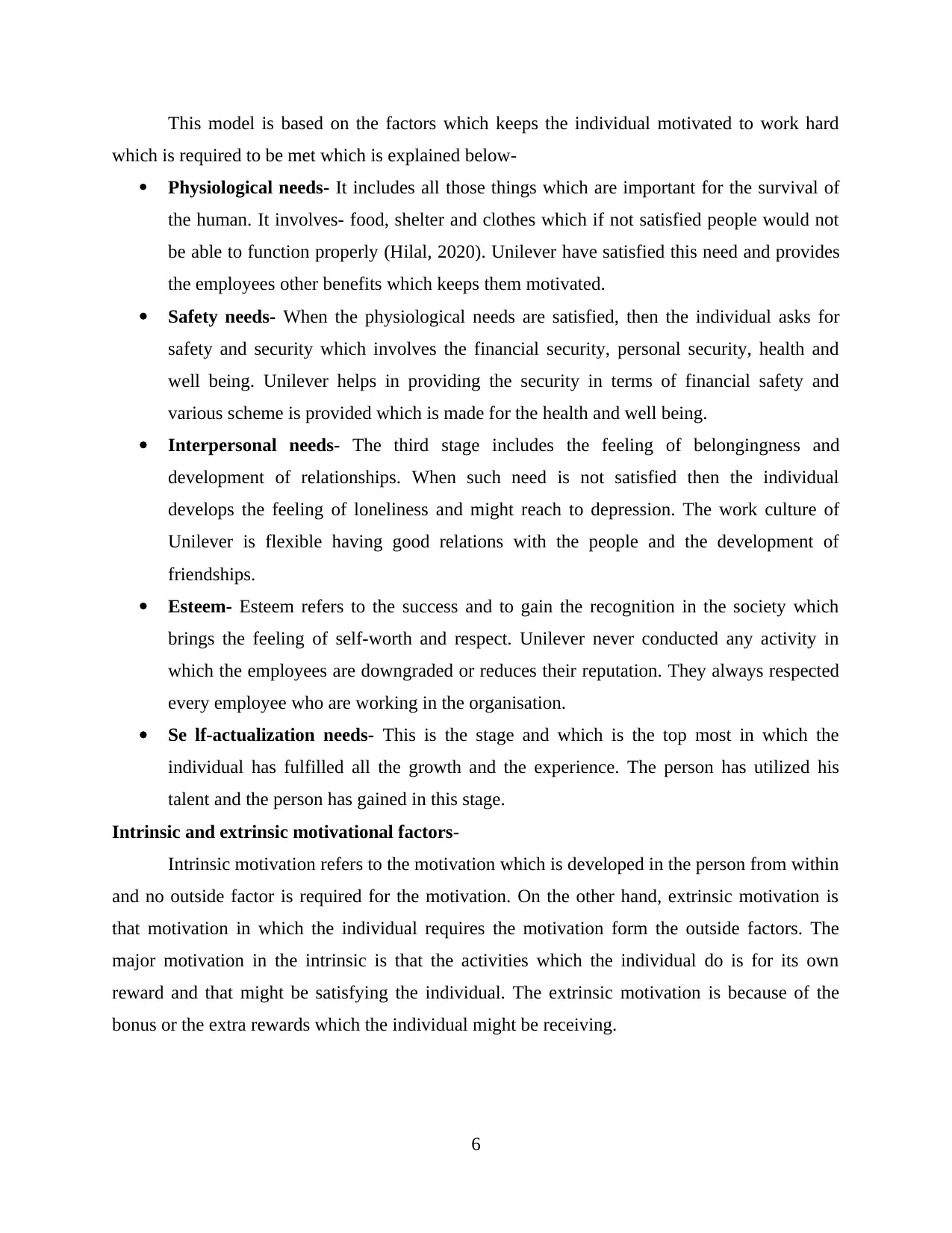
This model is based on the factors which keeps the individual motivated to work hard
which is required to be met which is explained below-
Physiological needs- It includes all those things which are important for the survival of
the human. It involves- food, shelter and clothes which if not satisfied people would not
be able to function properly (Hilal, 2020). Unilever have satisfied this need and provides
the employees other benefits which keeps them motivated.
Safety needs- When the physiological needs are satisfied, then the individual asks for
safety and security which involves the financial security, personal security, health and
well being. Unilever helps in providing the security in terms of financial safety and
various scheme is provided which is made for the health and well being.
Interpersonal needs- The third stage includes the feeling of belongingness and
development of relationships. When such need is not satisfied then the individual
develops the feeling of loneliness and might reach to depression. The work culture of
Unilever is flexible having good relations with the people and the development of
friendships.
Esteem- Esteem refers to the success and to gain the recognition in the society which
brings the feeling of self-worth and respect. Unilever never conducted any activity in
which the employees are downgraded or reduces their reputation. They always respected
every employee who are working in the organisation.
Se lf-actualization needs- This is the stage and which is the top most in which the
individual has fulfilled all the growth and the experience. The person has utilized his
talent and the person has gained in this stage.
Intrinsic and extrinsic motivational factors-
Intrinsic motivation refers to the motivation which is developed in the person from within
and no outside factor is required for the motivation. On the other hand, extrinsic motivation is
that motivation in which the individual requires the motivation form the outside factors. The
major motivation in the intrinsic is that the activities which the individual do is for its own
reward and that might be satisfying the individual. The extrinsic motivation is because of the
bonus or the extra rewards which the individual might be receiving.
6
which is required to be met which is explained below-
Physiological needs- It includes all those things which are important for the survival of
the human. It involves- food, shelter and clothes which if not satisfied people would not
be able to function properly (Hilal, 2020). Unilever have satisfied this need and provides
the employees other benefits which keeps them motivated.
Safety needs- When the physiological needs are satisfied, then the individual asks for
safety and security which involves the financial security, personal security, health and
well being. Unilever helps in providing the security in terms of financial safety and
various scheme is provided which is made for the health and well being.
Interpersonal needs- The third stage includes the feeling of belongingness and
development of relationships. When such need is not satisfied then the individual
develops the feeling of loneliness and might reach to depression. The work culture of
Unilever is flexible having good relations with the people and the development of
friendships.
Esteem- Esteem refers to the success and to gain the recognition in the society which
brings the feeling of self-worth and respect. Unilever never conducted any activity in
which the employees are downgraded or reduces their reputation. They always respected
every employee who are working in the organisation.
Se lf-actualization needs- This is the stage and which is the top most in which the
individual has fulfilled all the growth and the experience. The person has utilized his
talent and the person has gained in this stage.
Intrinsic and extrinsic motivational factors-
Intrinsic motivation refers to the motivation which is developed in the person from within
and no outside factor is required for the motivation. On the other hand, extrinsic motivation is
that motivation in which the individual requires the motivation form the outside factors. The
major motivation in the intrinsic is that the activities which the individual do is for its own
reward and that might be satisfying the individual. The extrinsic motivation is because of the
bonus or the extra rewards which the individual might be receiving.
6
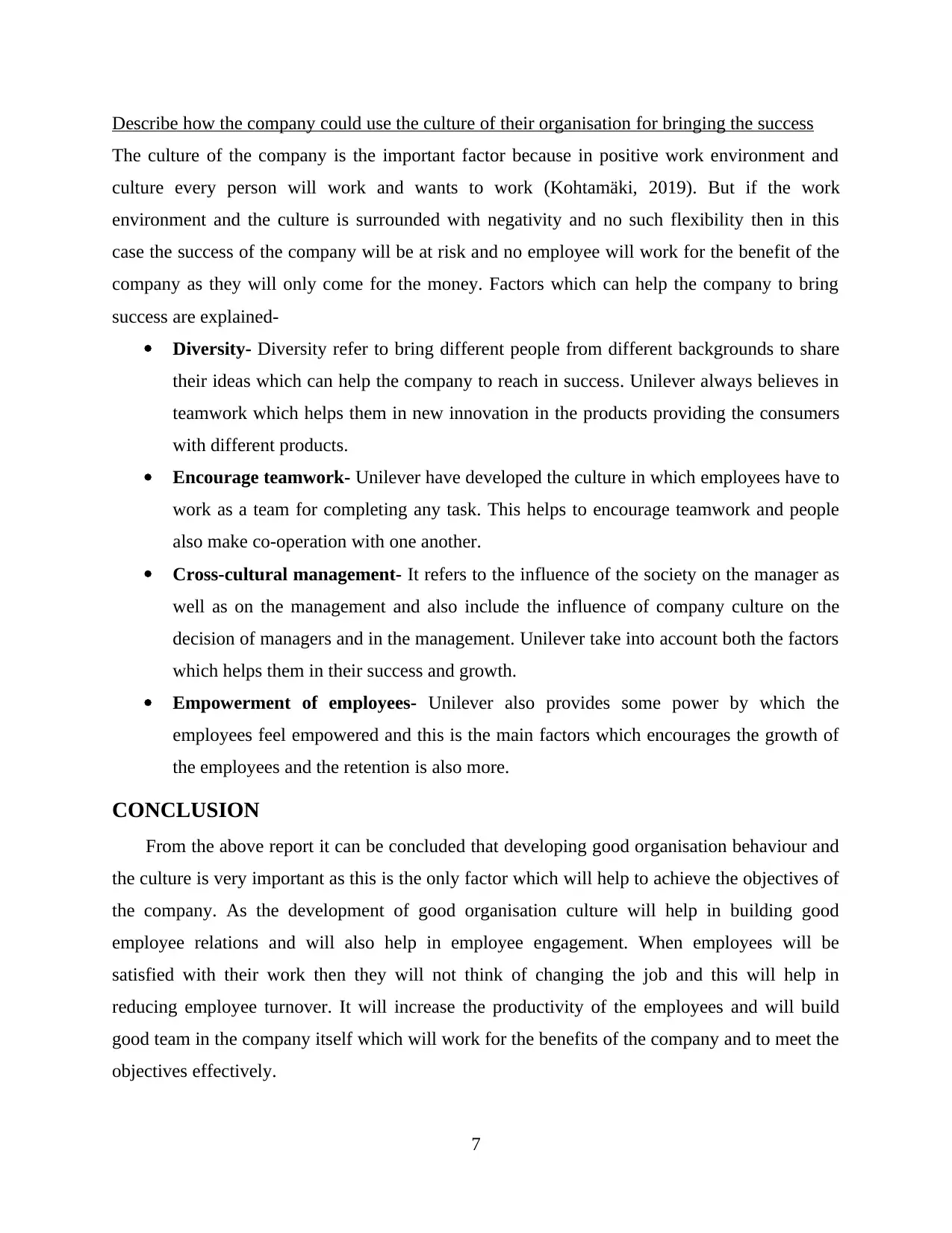
Describe how the company could use the culture of their organisation for bringing the success
The culture of the company is the important factor because in positive work environment and
culture every person will work and wants to work (Kohtamäki, 2019). But if the work
environment and the culture is surrounded with negativity and no such flexibility then in this
case the success of the company will be at risk and no employee will work for the benefit of the
company as they will only come for the money. Factors which can help the company to bring
success are explained-
Diversity- Diversity refer to bring different people from different backgrounds to share
their ideas which can help the company to reach in success. Unilever always believes in
teamwork which helps them in new innovation in the products providing the consumers
with different products.
Encourage teamwork- Unilever have developed the culture in which employees have to
work as a team for completing any task. This helps to encourage teamwork and people
also make co-operation with one another.
Cross-cultural management- It refers to the influence of the society on the manager as
well as on the management and also include the influence of company culture on the
decision of managers and in the management. Unilever take into account both the factors
which helps them in their success and growth.
Empowerment of employees- Unilever also provides some power by which the
employees feel empowered and this is the main factors which encourages the growth of
the employees and the retention is also more.
CONCLUSION
From the above report it can be concluded that developing good organisation behaviour and
the culture is very important as this is the only factor which will help to achieve the objectives of
the company. As the development of good organisation culture will help in building good
employee relations and will also help in employee engagement. When employees will be
satisfied with their work then they will not think of changing the job and this will help in
reducing employee turnover. It will increase the productivity of the employees and will build
good team in the company itself which will work for the benefits of the company and to meet the
objectives effectively.
7
The culture of the company is the important factor because in positive work environment and
culture every person will work and wants to work (Kohtamäki, 2019). But if the work
environment and the culture is surrounded with negativity and no such flexibility then in this
case the success of the company will be at risk and no employee will work for the benefit of the
company as they will only come for the money. Factors which can help the company to bring
success are explained-
Diversity- Diversity refer to bring different people from different backgrounds to share
their ideas which can help the company to reach in success. Unilever always believes in
teamwork which helps them in new innovation in the products providing the consumers
with different products.
Encourage teamwork- Unilever have developed the culture in which employees have to
work as a team for completing any task. This helps to encourage teamwork and people
also make co-operation with one another.
Cross-cultural management- It refers to the influence of the society on the manager as
well as on the management and also include the influence of company culture on the
decision of managers and in the management. Unilever take into account both the factors
which helps them in their success and growth.
Empowerment of employees- Unilever also provides some power by which the
employees feel empowered and this is the main factors which encourages the growth of
the employees and the retention is also more.
CONCLUSION
From the above report it can be concluded that developing good organisation behaviour and
the culture is very important as this is the only factor which will help to achieve the objectives of
the company. As the development of good organisation culture will help in building good
employee relations and will also help in employee engagement. When employees will be
satisfied with their work then they will not think of changing the job and this will help in
reducing employee turnover. It will increase the productivity of the employees and will build
good team in the company itself which will work for the benefits of the company and to meet the
objectives effectively.
7
⊘ This is a preview!⊘
Do you want full access?
Subscribe today to unlock all pages.

Trusted by 1+ million students worldwide
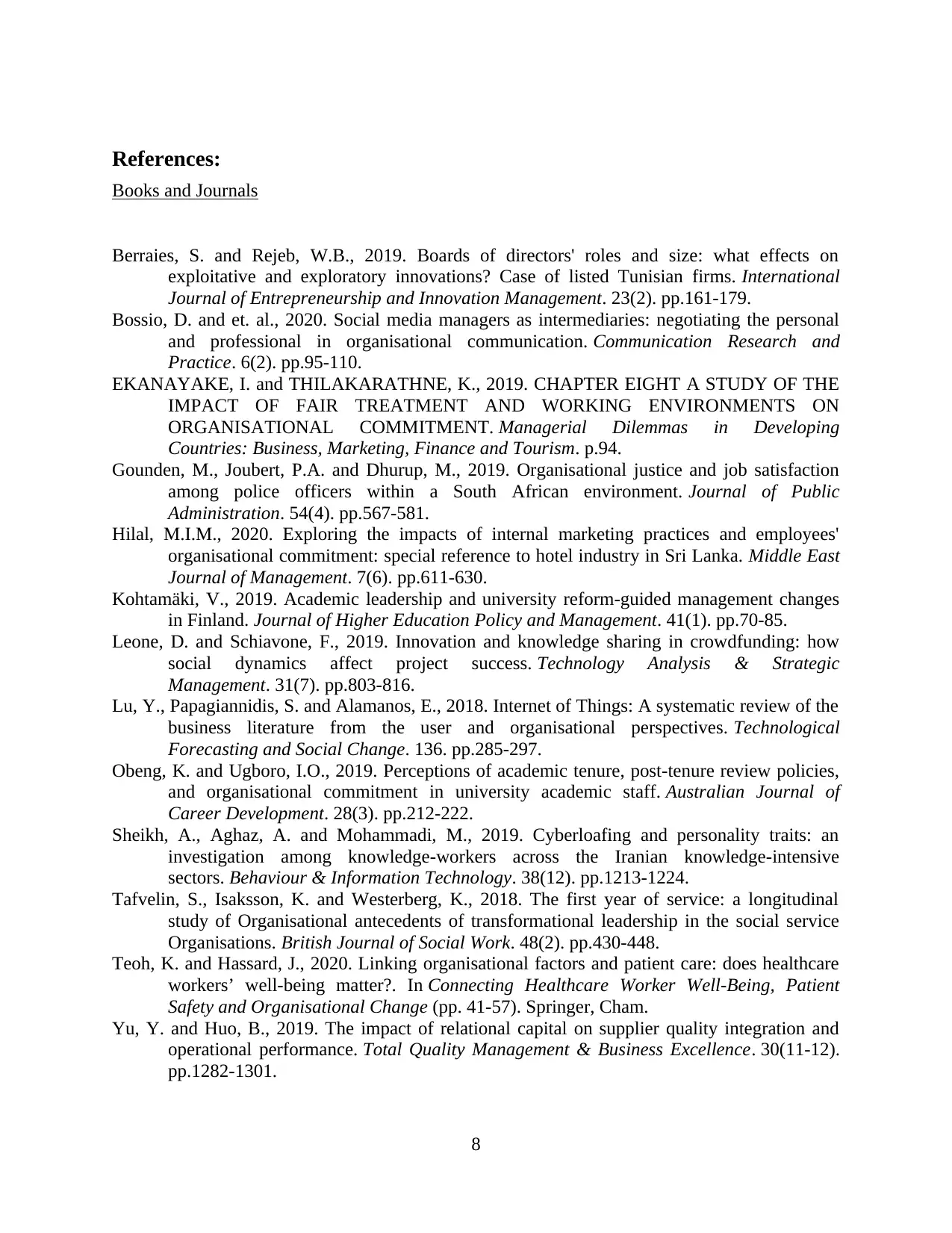
References:
Books and Journals
Berraies, S. and Rejeb, W.B., 2019. Boards of directors' roles and size: what effects on
exploitative and exploratory innovations? Case of listed Tunisian firms. International
Journal of Entrepreneurship and Innovation Management. 23(2). pp.161-179.
Bossio, D. and et. al., 2020. Social media managers as intermediaries: negotiating the personal
and professional in organisational communication. Communication Research and
Practice. 6(2). pp.95-110.
EKANAYAKE, I. and THILAKARATHNE, K., 2019. CHAPTER EIGHT A STUDY OF THE
IMPACT OF FAIR TREATMENT AND WORKING ENVIRONMENTS ON
ORGANISATIONAL COMMITMENT. Managerial Dilemmas in Developing
Countries: Business, Marketing, Finance and Tourism. p.94.
Gounden, M., Joubert, P.A. and Dhurup, M., 2019. Organisational justice and job satisfaction
among police officers within a South African environment. Journal of Public
Administration. 54(4). pp.567-581.
Hilal, M.I.M., 2020. Exploring the impacts of internal marketing practices and employees'
organisational commitment: special reference to hotel industry in Sri Lanka. Middle East
Journal of Management. 7(6). pp.611-630.
Kohtamäki, V., 2019. Academic leadership and university reform-guided management changes
in Finland. Journal of Higher Education Policy and Management. 41(1). pp.70-85.
Leone, D. and Schiavone, F., 2019. Innovation and knowledge sharing in crowdfunding: how
social dynamics affect project success. Technology Analysis & Strategic
Management. 31(7). pp.803-816.
Lu, Y., Papagiannidis, S. and Alamanos, E., 2018. Internet of Things: A systematic review of the
business literature from the user and organisational perspectives. Technological
Forecasting and Social Change. 136. pp.285-297.
Obeng, K. and Ugboro, I.O., 2019. Perceptions of academic tenure, post-tenure review policies,
and organisational commitment in university academic staff. Australian Journal of
Career Development. 28(3). pp.212-222.
Sheikh, A., Aghaz, A. and Mohammadi, M., 2019. Cyberloafing and personality traits: an
investigation among knowledge-workers across the Iranian knowledge-intensive
sectors. Behaviour & Information Technology. 38(12). pp.1213-1224.
Tafvelin, S., Isaksson, K. and Westerberg, K., 2018. The first year of service: a longitudinal
study of Organisational antecedents of transformational leadership in the social service
Organisations. British Journal of Social Work. 48(2). pp.430-448.
Teoh, K. and Hassard, J., 2020. Linking organisational factors and patient care: does healthcare
workers’ well-being matter?. In Connecting Healthcare Worker Well-Being, Patient
Safety and Organisational Change (pp. 41-57). Springer, Cham.
Yu, Y. and Huo, B., 2019. The impact of relational capital on supplier quality integration and
operational performance. Total Quality Management & Business Excellence. 30(11-12).
pp.1282-1301.
8
Books and Journals
Berraies, S. and Rejeb, W.B., 2019. Boards of directors' roles and size: what effects on
exploitative and exploratory innovations? Case of listed Tunisian firms. International
Journal of Entrepreneurship and Innovation Management. 23(2). pp.161-179.
Bossio, D. and et. al., 2020. Social media managers as intermediaries: negotiating the personal
and professional in organisational communication. Communication Research and
Practice. 6(2). pp.95-110.
EKANAYAKE, I. and THILAKARATHNE, K., 2019. CHAPTER EIGHT A STUDY OF THE
IMPACT OF FAIR TREATMENT AND WORKING ENVIRONMENTS ON
ORGANISATIONAL COMMITMENT. Managerial Dilemmas in Developing
Countries: Business, Marketing, Finance and Tourism. p.94.
Gounden, M., Joubert, P.A. and Dhurup, M., 2019. Organisational justice and job satisfaction
among police officers within a South African environment. Journal of Public
Administration. 54(4). pp.567-581.
Hilal, M.I.M., 2020. Exploring the impacts of internal marketing practices and employees'
organisational commitment: special reference to hotel industry in Sri Lanka. Middle East
Journal of Management. 7(6). pp.611-630.
Kohtamäki, V., 2019. Academic leadership and university reform-guided management changes
in Finland. Journal of Higher Education Policy and Management. 41(1). pp.70-85.
Leone, D. and Schiavone, F., 2019. Innovation and knowledge sharing in crowdfunding: how
social dynamics affect project success. Technology Analysis & Strategic
Management. 31(7). pp.803-816.
Lu, Y., Papagiannidis, S. and Alamanos, E., 2018. Internet of Things: A systematic review of the
business literature from the user and organisational perspectives. Technological
Forecasting and Social Change. 136. pp.285-297.
Obeng, K. and Ugboro, I.O., 2019. Perceptions of academic tenure, post-tenure review policies,
and organisational commitment in university academic staff. Australian Journal of
Career Development. 28(3). pp.212-222.
Sheikh, A., Aghaz, A. and Mohammadi, M., 2019. Cyberloafing and personality traits: an
investigation among knowledge-workers across the Iranian knowledge-intensive
sectors. Behaviour & Information Technology. 38(12). pp.1213-1224.
Tafvelin, S., Isaksson, K. and Westerberg, K., 2018. The first year of service: a longitudinal
study of Organisational antecedents of transformational leadership in the social service
Organisations. British Journal of Social Work. 48(2). pp.430-448.
Teoh, K. and Hassard, J., 2020. Linking organisational factors and patient care: does healthcare
workers’ well-being matter?. In Connecting Healthcare Worker Well-Being, Patient
Safety and Organisational Change (pp. 41-57). Springer, Cham.
Yu, Y. and Huo, B., 2019. The impact of relational capital on supplier quality integration and
operational performance. Total Quality Management & Business Excellence. 30(11-12).
pp.1282-1301.
8
Paraphrase This Document
Need a fresh take? Get an instant paraphrase of this document with our AI Paraphraser

9
1 out of 11
Related Documents
Your All-in-One AI-Powered Toolkit for Academic Success.
+13062052269
info@desklib.com
Available 24*7 on WhatsApp / Email
![[object Object]](/_next/static/media/star-bottom.7253800d.svg)
Unlock your academic potential
Copyright © 2020–2026 A2Z Services. All Rights Reserved. Developed and managed by ZUCOL.





